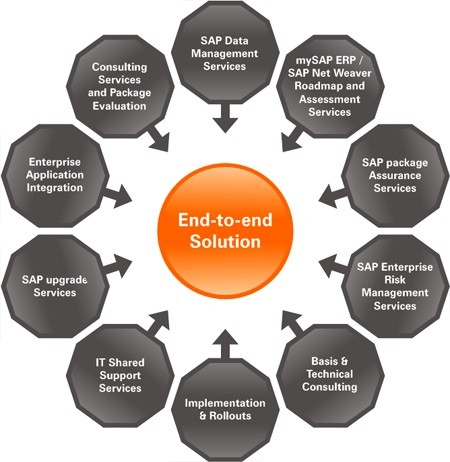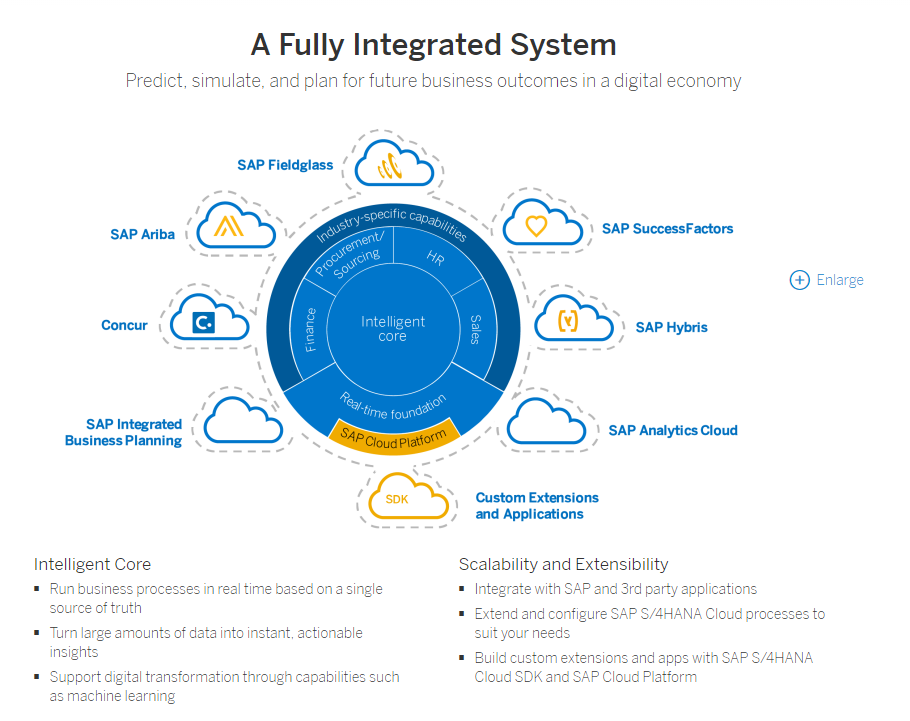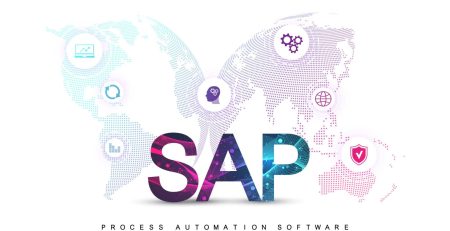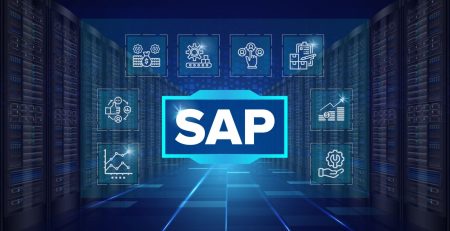Navigating the Cloud: The Future of SAP with Cloud Solutions
Unlock the future of SAP with cloud solutions. Discover scalability, cost efficiency, and enhanced security for your business.
The Changing Landscape of SAP
As an SAP professional, it is crucial to stay updated with the latest trends and innovations in the industry. The landscape of SAP has been evolving rapidly, driven by the need for more agile and efficient solutions. In this section, we will explore the trends and innovations that are shaping the future of SAP, with a particular focus on the shift towards cloud solutions.
Introduction to SAP Trends and Innovations
SAP, a global leader in enterprise software, has been at the forefront of innovation in the business technology landscape. Over the years, SAP has continuously evolved its offerings to meet the changing needs of businesses across various industries. From traditional on-premises solutions to cloud-based platforms, SAP has been adapting to the ever-changing digital landscape.
Today, businesses are seeking more agile and scalable solutions to drive their digital transformation journeys. This has led to the emergence of new trends and innovations within the SAP ecosystem. These include advancements in areas such as artificial intelligence, machine learning, Internet of Things (IoT), and big data analytics, among others. By leveraging these technologies, SAP is enabling businesses to make data-driven decisions, automate processes, and optimize operations.
The Shift Towards Cloud Solutions
One of the key trends reshaping the SAP landscape is the increasing adoption of cloud solutions. Cloud computing offers numerous benefits such as scalability, flexibility, cost-efficiency, and enhanced security. SAP has recognized these advantages and has been investing heavily in developing cloud-based solutions to meet the evolving needs of businesses.
Cloud-based SAP solutions empower organizations to achieve greater scalability and flexibility. They can easily scale their infrastructure up or down based on business requirements, allowing for efficient resource utilization. Additionally, cloud solutions enable businesses to access SAP applications and data from anywhere, anytime, using any device with an internet connection. This flexibility enhances collaboration and empowers remote workforces.
In terms of cost-efficiency, cloud solutions eliminate the need for significant upfront hardware and software investments. Instead, businesses pay for the services they consume on a subscription basis, reducing capital expenses. Cloud solutions also offer automatic software updates and maintenance, reducing the burden on IT teams and ensuring that businesses are always using the latest versions of SAP applications.
Furthermore, SAP has made significant advancements in enhancing the security and data protection of its cloud solutions. With robust data encryption, regular backups, and stringent access controls, businesses can trust that their critical data is secure in the cloud. SAP also ensures compliance with industry regulations and standards, providing businesses with peace of mind.
As the demand for cloud solutions continues to grow, SAP is making extensive efforts to support businesses in their cloud migration journeys. From providing cloud migration strategies to facilitating smooth integration with existing systems, SAP aims to simplify the transition to the cloud. Additionally, comprehensive training and support resources are available to help businesses navigate the complexities of adopting cloud-based SAP solutions.
In the next section, we will delve deeper into the benefits of SAP cloud solutions, exploring the scalability, cost efficiency, and enhanced security they offer. Stay tuned to learn more about how cloud solutions are revolutionizing the SAP landscape.
Note: If you want to learn more about SAP cloud computing and its role in digital transformation, check out our blog post on SAP Cloud Computing.
Benefits of SAP Cloud Solutions
When it comes to SAP cloud solutions, there are several key benefits that organizations can leverage to drive their business forward. These benefits include scalability and flexibility, cost efficiency, and enhanced security and data protection.
Scalability and Flexibility
One of the major advantages of SAP cloud solutions is the ability to scale resources up or down based on the organization’s needs. With traditional on-premises SAP systems, scaling resources often requires significant time and effort. However, with cloud-based solutions, organizations can easily adjust their resources to accommodate changes in demand or business growth.
Cloud solutions provide the flexibility to add or remove users, increase storage capacity, and adjust computing power without the need for extensive hardware upgrades or complex installations. This scalability and flexibility enable organizations to quickly respond to market dynamics and seize new opportunities, ensuring that their SAP systems can keep up with evolving business requirements.
Cost Efficiency
SAP cloud solutions offer cost efficiency by eliminating the need for organizations to invest in expensive hardware infrastructure and ongoing maintenance. With cloud-based models, organizations pay for the resources they consume on a subscription basis, which can result in substantial cost savings.
By migrating to the cloud, organizations can avoid upfront capital expenditures, reduce hardware and software maintenance costs, and minimize the need for dedicated IT staff to manage infrastructure. Additionally, cloud solutions enable organizations to optimize resource utilization, ensuring that they only pay for the computing power and storage they actually need.
Enhanced Security and Data Protection
Security and data protection are paramount concerns for organizations when it comes to their SAP systems. Cloud providers invest heavily in robust security measures to safeguard customer data. They employ advanced encryption, access controls, and regular security audits to protect sensitive information from unauthorized access or breaches.
Cloud solutions also provide robust data backup and disaster recovery capabilities. By leveraging redundant infrastructure and automated backup processes, organizations can minimize the risk of data loss and ensure business continuity in the event of a disaster or system failure.
Furthermore, cloud providers often comply with industry-specific regulations and standards, providing organizations with peace of mind that their SAP systems are aligned with the necessary security and compliance requirements.
The benefits of SAP cloud solutions go beyond scalability, cost efficiency, and security. Organizations can also leverage cloud solutions to drive innovation, enable seamless integration with existing systems, and support their digital transformation efforts. To learn more about SAP cloud computing and its role in the intelligent enterprise, check out our article on SAP cloud computing and SAP digital transformation.
In the next section, we will explore industry-specific adaptations of SAP cloud solutions, highlighting how organizations can tailor these solutions to meet the unique requirements of their respective industries.
Industry-Specific Adaptations
As SAP continues to evolve in the era of cloud computing, it recognizes the importance of catering to the unique needs of different industries. To ensure optimal functionality and effectiveness, SAP offers customization for different industries and vertical-specific solutions.
Customization for Different Industries
SAP understands that each industry has its own set of requirements, processes, and challenges. To address this, they provide industry-specific customization options for their cloud solutions. By tailoring the SAP software to meet the specific needs of an industry, organizations can optimize their operations, streamline processes, and achieve greater efficiency.
For example, manufacturing companies may require specific modules and functionalities to manage their supply chain, production planning, and quality control. On the other hand, healthcare organizations may need solutions that enable them to manage patient records, billing, and regulatory compliance. By customizing the SAP software to align with these industry-specific needs, organizations can enhance their productivity and drive innovation.
Vertical-Specific Solutions
In addition to customization, SAP also offers vertical-specific solutions that are designed to address the unique requirements of specific industries. These solutions are preconfigured with industry-specific best practices and processes, allowing organizations to quickly implement SAP cloud solutions without the need for extensive customization.
For example, SAP provides solutions tailored for industries such as retail, utilities, banking, and automotive. These solutions come with prebuilt functionalities and industry-specific features that enable organizations to accelerate their digital transformation and achieve a faster return on investment.
By offering both customization and vertical-specific solutions, SAP ensures that organizations in various industries can leverage the full potential of their cloud-based SAP solutions. This flexibility and adaptability allow businesses to stay ahead of the competition and meet the evolving demands of their industry.
To learn more about the benefits and future trends of SAP cloud solutions, check out our articles on SAP cloud computing and SAP digital transformation.
| Industry | Customization | Vertical-Specific Solutions |
|---|---|---|
| Manufacturing | Tailored modules for supply chain, production planning, and quality control. | Preconfigured solutions for optimizing manufacturing processes. |
| Healthcare | Customized features for managing patient records, billing, and compliance. | Industry-specific solutions for healthcare institutions. |
| Retail | Customization options for inventory management, point-of-sale, and customer experience. | Prebuilt solutions for retail industry operations. |
| Utilities | Tailored functionalities for managing energy generation, distribution, and billing. | Vertical-specific solutions for utility companies. |
| Banking | Customized features for financial transactions, risk management, and compliance. | Preconfigured solutions for banking industry requirements. |
| Automotive | Tailored modules for supply chain management, manufacturing, and sales. | Industry-specific solutions for the automotive sector. |
With the availability of customization and vertical-specific solutions, organizations can leverage the power of SAP cloud solutions to drive success in their respective industries.

Embracing Cloud-Based SAP Solutions
As businesses look towards the future of SAP, cloud-based solutions are gaining significant traction. The ability to harness the power of the cloud offers numerous advantages for SAP implementations. In this section, we will explore three important aspects of embracing cloud-based SAP solutions: migration strategies to the cloud, integration with existing systems, and training and support for a smooth transition.

Migration Strategies to the Cloud
Migrating SAP to the cloud requires careful planning and execution. There are several strategies that organizations can consider, depending on their specific needs and requirements. These strategies include:
- Lift and Shift: This strategy involves moving SAP systems and applications as-is to the cloud infrastructure. It offers a relatively quick and straightforward migration process, but may not take full advantage of cloud-native features and optimizations.
- Rehosting and Optimization: With this strategy, organizations move their SAP systems to the cloud and take the opportunity to optimize and modernize their infrastructure. It allows for better scalability, flexibility, and cost optimization.
- Rearchitecting and Transformation: This strategy involves reimagining SAP applications and processes to fully leverage cloud-native capabilities. It requires a more significant investment of time and resources but offers the potential for greater innovation and agility.
Whichever strategy is chosen, it’s important to work closely with experienced SAP and cloud solution providers to ensure a successful migration. For further insights into the migration process, refer to our article on SAP cloud migration.
Integration with Existing Systems
Integrating cloud-based SAP solutions with existing systems is a critical consideration. Seamless integration ensures that data flows smoothly between different systems, enabling efficient business processes and real-time insights. Key factors to consider during the integration process include:
- Data and Application Integration: Establishing robust integration mechanisms to enable data synchronization and application interoperability.
- API Management: Implementing API management tools and practices to facilitate secure and controlled access to SAP systems and data.
- Legacy System Compatibility: Ensuring compatibility between cloud-based SAP solutions and existing legacy systems to preserve previous investments and minimize disruptions.
By prioritizing integration efforts, organizations can maximize the benefits of cloud-based SAP solutions and minimize potential challenges. For more information on SAP innovations and digital transformation, refer to our article on SAP innovations.
Training and Support for Cloud Adoption
Transitioning to cloud-based SAP solutions requires comprehensive training and ongoing support to ensure a smooth adoption process. Key considerations include:
- Training Programs: Providing training programs to equip employees with the necessary skills and knowledge to effectively utilize cloud-based SAP solutions.
- Change Management: Implementing change management strategies to address any resistance or concerns from employees during the transition process.
- Support and Maintenance: Ensuring the availability of technical support and maintenance services to address any issues or challenges that may arise.
By investing in comprehensive training and support, organizations can empower their workforce to leverage the full potential of cloud-based SAP solutions. For more information on the intelligent enterprise and digital transformation, refer to our article on SAP intelligent enterprise.
As the future of SAP continues to evolve, embracing cloud-based solutions becomes increasingly important. By carefully considering migration strategies, integration with existing systems, and providing comprehensive training and support, organizations can unlock the full potential of SAP in the cloud.
Future Outlook for SAP with Cloud Solutions
As we look to the future of SAP, it’s clear that cloud solutions will play a significant role in shaping the evolution of this enterprise software. With emerging technologies and a shifting business landscape, SAP professionals, IT managers, and business leaders need to understand the potential challenges, opportunities, and the role of the cloud in SAP’s future.
Emerging Technologies in SAP
SAP is constantly evolving to keep pace with emerging technologies that drive innovation and digital transformation. Some of the key technologies that are expected to shape the future of SAP include artificial intelligence (AI), machine learning (ML), Internet of Things (IoT), and blockchain.
AI and ML have the potential to revolutionize how businesses analyze data, automate processes, and make informed decisions. SAP is leveraging these technologies to develop intelligent applications, such as chatbots and predictive analytics, that enhance operational efficiency and drive business growth.
The IoT is another area where SAP is making significant strides. By leveraging the power of connected devices and real-time data, businesses can optimize their supply chains, improve asset management, and enhance customer experiences.
Blockchain, with its decentralized and transparent nature, has the potential to revolutionize trust and security in business transactions. SAP is exploring how blockchain can be integrated into its solutions to ensure secure and immutable transactions across various industries.
The Role of Cloud in SAP’s Evolution
Cloud solutions have become an integral part of SAP’s strategy for the future. The cloud offers numerous benefits, including scalability, flexibility, and cost efficiency. By transitioning to the cloud, businesses can scale their SAP infrastructure based on demand, access their systems from anywhere, and reduce the need for hardware investments and maintenance.
SAP cloud solutions also provide enhanced security and data protection. Cloud providers employ robust security measures, including encryption, authentication, and regular backups, to ensure the confidentiality, integrity, and availability of data. This allows businesses to focus on their core operations while leaving the responsibility of data security to experienced cloud providers.
Potential Challenges and Opportunities
While the future of SAP with cloud solutions is promising, there are also potential challenges that need to be addressed. One of the challenges is the migration process from on-premises SAP systems to the cloud. It requires careful planning, data migration strategies, and testing to ensure a smooth transition. SAP professionals and IT teams need to have a clear understanding of the migration process and consider factors such as data integrity, system compatibility, and user training.
Integration with existing systems is another challenge that businesses may face when adopting cloud-based SAP solutions. Seamless integration between SAP modules, third-party applications, and legacy systems is crucial for achieving a unified and efficient IT landscape. Businesses must invest in robust integration tools and strategies to ensure smooth data flow and business process automation.
Despite these challenges, the future of SAP with cloud solutions presents numerous opportunities for businesses. Cloud-based SAP solutions enable industry-specific adaptations and provide vertical-specific solutions tailored to the unique needs of various sectors. This allows businesses to leverage SAP’s capabilities and industry expertise to drive innovation, improve operational efficiency, and gain a competitive edge.
As SAP continues to innovate and adapt to the changing business landscape, businesses that embrace cloud-based SAP solutions have the potential to transform their operations, enhance customer experiences, and achieve long-term success.
To learn more about SAP cloud solutions and related topics, check out our articles on SAP cloud computing, SAP digital transformation, SAP intelligent enterprise, and SAP cloud migration.
GETTING STARTED
Transform Your Business Today - Get Your Custom Quote Now
- Tailored Solutions: Receive a personalized quote that aligns perfectly with your business needs and goals.
- Expert Guidance: Leverage Orlando Monteiro's extensive experience in business transformation and digital innovation.
- Cost-Effective Strategies: Discover how you can optimize your operations and reduce costs with our expert solutions.
- Immediate Impact: Start seeing tangible results in your business efficiency and productivity right away.
- Long-Term Success: Embark on a journey towards sustainable growth and competitive advantage with our strategic guidance.












Comment (1)
[…] Cloud-Based Solutions: SAP offers a range of cloud-based solutions that provide flexibility, scalability, and cost-effectiveness. By leveraging cloud technology for SAP solutions, businesses can access real-time data, enhance collaboration, and simplify IT infrastructure. To delve deeper into the benefits of cloud-based SAP solutions, refer to our article on SAP cloud solutions. […]